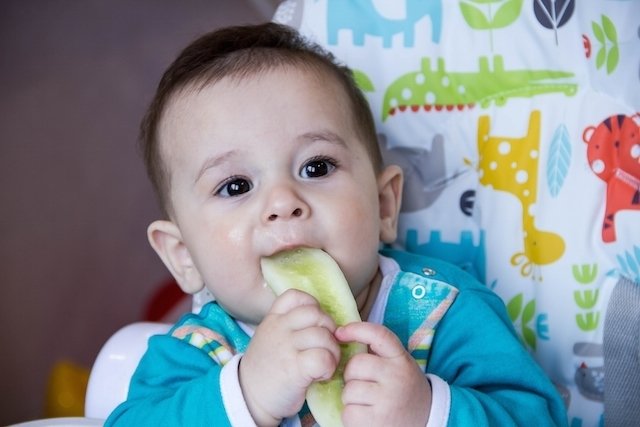The baby should only be fed with breast milk or infant formula until 6 months of age. However, from the 6th month onwards, milk no longer provides all the nutrients that the baby needs to develop and, therefore, the Brazilian Society of Pediatrics recommends the introduction of foods into the baby’s diet.
Therefore, the baby should start eating mashed or scraped fruit porridge, as well as a main porridge, prepared with vegetables, tubers, legumes and proteins. Furthermore, when the baby starts complementary feeding, it is important that they also drink water between meals to avoid dehydration, constipation or kidney overload.
The gradual introduction of foods should be done after evaluation by a pediatrician or nutritionist, who will adapt the types and amounts of food for each baby. Know when to start introducing foods into your baby’s diet.

Baby food should be according to age:
1. From 0 to 6 months
The baby’s feeding in the first 6 months should only be with breast milk or infant formula.
Breast milk provides all the nutrients the baby needs and should be offered on demand, that is, when the baby wants it. The Brazilian Society of Pediatrics recommends that, when possible, breast milk be offered to children until they are 2 years of age or older. Furthermore, exclusive breast milk until 6 months of age provides the amount of water the baby needs.
Infant formula also offers the necessary nutrients for the baby and is recommended when the mother is unable to breastfeed or when she is undergoing a treatment where breastfeeding is not recommended. Baby who feeds on infant formula should drink 700 ml of water throughout the day, and pure water may be offered, in addition to that used to prepare bottles, as recommended by the pediatrician. See the amount of water according to the baby’s age.
2. From 6 months
From 6 months onwards, foods are gradually introduced into the baby’s diet that complement breast milk or infant formula. At this stage, the baby must have a total of 3 meals per day, with 1 fruit porridge for the morning snack and afternoon snack, and 1 main porridge for lunch or dinner. Understand better how your baby should be fed at 6 months.
The fruits, vegetables, cereals and proteins in the porridge must be offered separately on the plate, so that the baby knows the different flavors and textures of the food, and the porridge must be prepared as in the following examples:
- fruit potato: fresh fruits should be preferred as they are a source of vitamins, fiber and minerals and should be scraped or mashed, such as bananas, avocados, mangoes, oranges, pears and apples;
- Papa principal: this porridge must be prepared with 1 serving of cereals, such as rice and pasta, or tubers, such as cassava and potatoes + 1 serving of vegetables, such as pumpkin, broccoli and carrots + 1 serving of legumes, such as beans + 1 serving of protein, such as meat or fish. It must be mashed with a fork and can be seasoned with fresh herbs, without adding salt.
It is important that the baby eats the food separately on the plate, as this also makes it easier for parents to identify if any food causes an allergy or intolerance.
At this stage, the baby’s main food is still breast milk or infant formula, which should be offered with fruit porridge and at other times throughout the day.
Water intake: As the baby starts to eat some foods, increasing the intake of fiber, proteins and sodium, he should also drink 700 ml of water per day, distributed between the water from breast milk or infant formula, the water used in preparations, such as soups and stews , and pure water.
3. From 7 to 8 months
From 7 to 8 months, the baby starts to eat one more main porridge per day, with 1 main porridge at lunch and another at dinner, in addition to 1 fruit porridge for a morning and afternoon snack. Porridge should be prepared with fresh fruits and vegetables, cereals or tubers, protein and legumes. Find out more about how your baby should be fed from 7 months onwards.
Breast milk, which should be offered according to the child’s wishes, or infant formula, following the pediatrician’s recommendation, are still the baby’s main meals at this age and should be offered with fruit porridge and other meals in the baby. day.
Water intake: The need for water increases slightly from 7 months onwards, with an intake of 800ml per day being recommended. It is important to consider the water from breast milk, or the water used from infant formula, the water used to prepare soups and stews and pure water, which should be given to the baby throughout the day and in small portions.
4. From 9 to 11 months
From 9 to 11 months, the baby chews better and can start eating chopped foods and shredded meats. At this stage, the baby continues to eat main porridge for lunch and dinner, and fresh fruit porridge for morning and afternoon snacks, along with breast milk or infant formula. See some baby food recipes for babies aged 9 months.
Breast milk or infant formula are still necessary for the baby at this stage, but the food now provides more nutrients and energy that the baby needs. Therefore, it is important to pay attention to signs of hunger, when the child is happy or points to food, and satiety, when the child eats more slowly, pushes the food away or takes a long time to swallow, for example.
Water intake: From 9 to 11 months, the recommended water intake remains at around 800 ml per day, taking into account water from breast milk or infant formula, pure water and water used in preparations such as soups and stews.
5. From 12 months
From 12 months onwards, some teeth begin to appear in the baby and he can already hold a spoon. With this, the baby can start eating the same foods as the rest of the family, but it is important that they still have the supervision of their parents or guardians.
Another portion of fruit should be added to the baby’s breakfast. As a result, he starts eating fresh fruit porridge for breakfast, as a morning and afternoon snack along with breast milk, cow’s milk, or infant formula, and the main porridge for lunch and dinner.
For babies over 12 months old who are not breastfed, whole cow’s milk is recommended as it is a drink rich in calcium, an important mineral for the formation of bones and teeth. However, excessive consumption of milk can hinder the absorption of iron, an important mineral to prevent anemia and, therefore, the baby should consume a maximum of 600 ml of this drink per day.
However, in situations such as intolerances and allergies, for example, cow’s milk is not recommended. Therefore, before offering this type of milk to your baby, it is recommended to talk to your pediatrician.
Water intake: It is recommended that you give around 1300 ml of water per day from 12 months onwards, including pure water (which should be given in a glass or cup and between meals), water from breast milk or infant formula, and the water used in preparations such as soups.
What baby shouldn’t eat
According to the Brazilian Society of Pediatrics, babies should not eat processed foods, such as chocolates, sausages, ice cream, cookies, boxed or powdered juices, soft drinks or ready-made sauces. Furthermore, it is also not recommended to use salt or sugar when preparing meals for children up to 2 years of age. See more examples of foods that babies cannot eat until they are 2 years old.
At this stage, the baby’s taste buds are developing and they can get used to the excess fat, sweet or salty taste of these types of foods, contributing to poor eating habits, which can cause obesity or other health problems in childhood. .
Advantages of breast milk
Breast milk is a complete food that has all the nutrients necessary for the baby’s healthy growth and development, in addition to being easy to digest and providing antibodies that strengthen the immune system. For these reasons, breast milk is recommended exclusively until 6 months, and can be maintained until 2 years of age or beyond, even if the child already eats all of his meals.
In addition to the benefits for the baby, breastfeeding also brings benefits to the mother, such as strengthening the relationship with the baby, helping with weight loss, reducing bleeding after birth and preventing breast, ovarian and endometrial cancer.
When to use infant formula
The use of infant formula is only recommended by pediatricians when the mother is unable to breastfeed or when breastfeeding is contraindicated, such as in the case of contagious diseases or the use of some medications.
To feed your baby with infant formula, you must follow your pediatrician’s recommendations on the type and amount of formula suitable for each baby. It is also important to remember that children using infant formula need to drink water to avoid constipation and kidney strain.

Sign up for our newsletter and stay up to date with exclusive news
that can transform your routine!
Warning: Undefined array key "title" in /home/storelat/public_html/wp-content/plugins/link-whisper-premium/templates/frontend/related-posts.php on line 12
Warning: Undefined array key "title_tag" in /home/storelat/public_html/wp-content/plugins/link-whisper-premium/templates/frontend/related-posts.php on line 13



